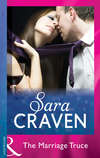Czytaj książkę: «The Marriage Truce»
The Marriage Truce
Sara Craven

Former journalist SARA CRAVEN published her first novel ‘Garden of Dreams’ for Mills & Boon in 1975. Apart from her writing (naturally!) her passions include reading, bridge, Italian cities, Greek islands, the French language and countryside, and her rescue Jack Russell/cross Button. She has appeared on several TV quiz shows and in 1997 became UK TV Mastermind champion. She lives near her family in Warwickshire – Shakespeare country.
Table of Contents
Cover
Title Page
About the Author
CHAPTER ONE
CHAPTER TWO
CHAPTER THREE
CHAPTER FOUR
CHAPTER FIVE
CHAPTER SIX
CHAPTER SEVEN
CHAPTER EIGHT
CHAPTER NINE
CHAPTER TEN
Endpage
Copyright
CHAPTER ONE
‘ARE you telling me that Ross is here—staying in the village? That he’s come back and you didn’t warn me?’ Jenna Lang’s face was ashen, her eyes blazing. ‘Oh, Aunt Grace—how could you?’
‘Because we didn’t know until a couple of days ago—not for certain.’ Mrs Penloe’s kindly face was crumpled with worry as she looked pleadingly back at her niece. ‘I thought—I hoped—it was just a bit of village gossip, and Betty Fox had got it all wrong. After all, it wouldn’t be the first time.’
She shook her head. ‘It never occurred to me that Thirza could really be so insensitive …’
‘Ross’s besotted stepmother—in whose eyes he can do no wrong?’ Jenna’s voice was icy with bitterness. ‘The woman who blamed me for the break-up of our marriage? Oh, I can believe it.’
‘I suppose she’s bound to be loyal,’ Mrs Penloe said, trying to be fair. ‘After all, he was only seven when she married his father—another one with too much charm for his own good,’ she added grimly. ‘And that’s sure to create a bond. Although that’s no excuse for what she’s done …’
‘What’s Thirza doing back in Polcarrow, anyway?’ Jenna demanded. ‘I thought she was supposed to be spending the whole year in Australia.’
‘Too hot and too many insects,’ her aunt said distractedly. ‘Or so she claims. Interfered with her inspiration. She came back about three weeks ago.’
‘Brilliant timing.’ Jenna laughed shortly and mirthlessly. ‘She always knew how to pick her moments.’
‘She claims she had no choice.’ Mrs Penloe hesitated. ‘Apparently Ross’s been really ill—picked up some ghastly virus on his last trip. When he was discharged from hospital he needed somewhere to recuperate.’ She sighed. ‘Knowing Thirza, I don’t suppose she gave Christy’s wedding, or your role in it, even a second thought.’
‘No,’ Jenna said bitingly. ‘I’m the one who’ll have to seriously reconsider.’
‘Oh, Jenna, my dear—you’re not going to leave—go back to London?’ Mrs Penloe asked anxiously. ‘Because Christy would be devastated. And it’s all my fault. I know I should have said something. I suppose I hoped it might all—go away.’
‘Or that I might never find out?’ Jenna asked ironically. ‘Hardly likely when Thirza will probably bring him with her to the wedding.’
‘Oh, Jenna—surely not even Thirza …’
Jenna shrugged. ‘Why not? She’s capable of anything. And I presume she’s been invited?’
‘Well, yes, but we never thought she’d come. We thought she’d still be in Australia.’ Mrs Penloe ran a hand through her greying curly hair. ‘Oh, what a mess. Why couldn’t Christy have chosen a June wedding instead? Ross would be long gone by then. And the weather would have been better, too,’ she added, momentarily diverted by the threatening sky with its ragged, hurrying clouds framed by the drawing room window. ‘Not that it matters, of course, compared with the sheer embarrassment of Thirza’s behaviour.
‘Surely she could have found a good nursing home somewhere—and don’t tell me that Ross can’t afford it, for he earns a fortune and probably has the best health insurance money can buy. Or she could have looked after him in his own home—wherever that is now. Anything rather than this.’
‘Maybe it isn’t too late for that, even now,’ Jenna said slowly. ‘Do you think Uncle Henry would talk to her—persuade her?’
‘Darling, that was the first thing I thought of. All he said was that Thirza might be his cousin but she was a law unto herself and always had been.’ She drew a long breath. ‘Also that he had enough on his plate with the bills for the wedding, and that as you and Ross had been divorced for two years it could be time for you both to move on.’ She paused, giving her niece another pleading look. ‘And I suppose, in a way, he does have a point.’
‘I’m sure he’s right,’ Jenna said. ‘But, unfortunately, it’s a point I haven’t reached yet. Because it wasn’t just the divorce …’ She stopped, biting her lip.
‘I know, dearest, I know.’ Mrs Penloe hunted for a handkerchief and blew her nose. ‘So much sadness—and no one could expect you to forget …’
‘Or forgive.’ Jenna’s voice was stony. She got to her feet, reaching for her brown suede jacket. ‘I’m going for a walk, Aunt Grace. I need to think, and some fresh air might help.’
‘Fresh air?’ Mrs Penloe echoed. ‘It’s blowing a force eight gale out there.’
But her protest fell on deaf ears. Jenna was already heading out of the room, and a moment later Mrs Penloe heard the front door bang shut.
She sank back against the sofa cushions and indulged herself with a little weep. She had every sympathy with Jenna, but she was also the mother of a beloved daughter who was getting married in three days’ time, and who might find herself walking up the aisle of the village church without her only cousin in attendance behind her.
Grace Penloe was not a violent woman, but she felt strongly that if she could have got her hands round Thirza Grantham’s throat she would probably have strangled her.
Meanwhile, Jenna was striding through the garden, her face pale and set, her tearless eyes staring rigidly ahead.
Spring had come softly to Cornwall that year, and then, suddenly and maliciously, reverted to winter with driving showers of hail and sleet, and gales that sent the seas battering at the coastline.
The Penloes, who’d built Trevarne House on the headland that tapered into the Atlantic, had protected their grounds from the prevailing winds with high stone walls, but Jenna chose not to remain within their shelter.
Instead, after a brief battle with the heavy latch, she pushed open the tall iron gate at the end of the garden, and stepped out on to the short, stubby grass of Trevarne Head itself.
As she turned to pull the gate shut behind her the wind tore at her loose knot of chestnut hair and whipped it free, so that it streamed behind her like a bright, silken pennant.
For a moment she paused, trying to subdue it into a braid, then realised her fingers were shaking too much so gave up the unequal struggle and walked on, digging her hands into the pockets of her jacket, her head bent and shoulders hunched as she met the full force of the wind.
She had the headland to herself. The hurrying clouds and harsh wind had kept other people away, but for Jenna the weather suited the bleakness of her mood.
Long before she reached the small concrete observation platform which had been built into the turf she could feel the icy spray from the sea chilling her face, tingling against her skin, and paused, gasping for breath.
She would not, she decided, go any closer to the edge. She was not prepared to risk the odd, erratic gust which might carry her over to the sharp rocks and boiling surf far below.
She might be upset. She was certainly angry. But she was sure as hell not suicidal.
She gripped the back of the bench seat, which was bolted to the platform, and looked at the dramatic panorama in front of her.
The sea was alive and furious, streaked in grass-green and indigo as it flung itself against the granite promontory. She could hear its boom and hiss as it raced up the inlet that divided Trevarne from the cliffs of Polcarrow itself, then fell back in frustration.
Lifting her head, she watched the sea birds that swooped and dived, and rode on the waves.
Tossed by fate, she thought ironically, as she was herself.
And she had not seen it coming, although she couldn’t say she hadn’t been warned.
‘Are you sure you want to do this?’ Natasha, her business partner, had asked, her slanting brows drawn together in a concerned frown. ‘Isn’t it asking for trouble?’
Jenna shrugged. ‘Christy and I promised each other years ago that she’d be my bridesmaid and I’d be hers. She kept her side of the pledge. Now it’s my turn, and I can’t let her down.’ She paused. ‘Nor would I want to.’
Natasha gave her a wry look. ‘Not even when it’s the very same church that you were married in?’ she queried. ‘With all the memories that’s bound to entail?’
Jenna bit her lip. ‘It’s a very old church,’ she said quietly. ‘And I’m sure a lot of happy marriages have been celebrated there, so it will have good vibes, too.’
‘Well, it’s your decision,’ Natasha said. ‘But I helped pick up the pieces the first time, remember, and I don’t want to find you back at square one for the sake of a family wedding.’
Jenna lifted her hands. ‘That’s all in the past, I promise. Now all I care about is the present—and the future.’
Brave words, she told herself now, staring sightlessly at the grey horizon. And I might—just —have got away with them. If only Ross hadn’t come back …
She couldn’t believe the pain that had seized her—torn at her when she’d heard the news of his return. Or how easily her carefully constructed edifice of control and self-belief had crumpled.
She wasn’t suffering from some reality bypass. She’d always known it was inevitable that she and her ex-husband would meet again one day. But she’d hoped desperately that the meeting would be far, far in the future, when she might finally have come to terms with his betrayal of her.
Yet it seemed it was to be here and now—in this remote Cornish peninsula which she had always regarded as her personal haven.
It was to Trevarne House that she’d come as a scared ten-year-old after her mother’s death, to the care of her aunt and uncle, leaving her father free to assuage his own grief by abandoning the desk job he hated and roaming the world as a troubleshooter for the giant oil company he worked for.
And here, on her mother’s soil, she’d put down faltering roots in the Penloes’ kind, easygoing household, while she and Christy, both only children, had found in each other the sister they’d always wanted.
And when, a couple of years later, her father had been killed in a freak accident when his car tyre had burst on a tricky mountain road, she had been absorbed seamlessly into the family as another daughter of the house.
All the same, she’d thought long and hard before accepting Christy’s invitation to the wedding, in spite of their childhood vow. Eventually she’d allowed herself to be swayed by the knowledge that Thirza Grantham, the only potential fly in the ointment, was on the other side of the world.
Where Ross himself was to be found had been anyone’s guess. She went out of her way to ignore the scraps of information that filtered through concerning his whereabouts.
Impossible, of course, she’d discovered, to cut him out of her awareness completely. To forget, as she longed to do, that he’d ever existed. For that she’d need some kind of emotional lobotomy, she thought broodingly.
Besides, there was evidence of him everywhere. The photographs which he sent back to his agency from every trouble spot in the world were still winning him prizes and awards with monotonous regularity.
‘It can’t be a real war,’ someone had once joked. ‘Ross Grantham isn’t there yet.’
No, his profile was far too public for her to be able to exercise any kind of selective amnesia where he was concerned, and somehow she had to live with that.
It was strange, she thought, that she hadn’t run into him in London before now. On dozens of occasions she’d thought she’d glimpsed him on the street, or across busy restaurants, even among the interval crowds at the theatre, and had felt the swift wrench of panic deep in her guts, only to realise, belatedly, that she was running scared of some complete stranger.
But then wasn’t that what Ross himself had always been? she asked herself with bitter irony. A charming stranger who had murmured words of love to her, slept with her, given her for a few ecstatic weeks the prospect of motherhood, then abandoned her to pursue a casual affair while she was still recovering from the pain and trauma of her loss.
She sank her teeth into her bottom lip until she tasted blood. That was forbidden territory to her now, and she would not go there.
She’d persuaded herself that, with Thirza away, Polcarrow would be safe enough. That Ross would not come visiting unless his stepmother was there—had, indeed, not been back since the divorce.
Only, unpredictable as ever, Thirza had returned …
And as a result her life had been sent spinning once more into confusion—and fear.
Although there was no reason for her to be scared of any confrontation, she told herself defiantly. She, after all, had been the innocent party in the collapse of their brief ill-starred marriage. It was Ross who’d been the guilty party—the deceiver—the betrayer.
He, she thought with sudden savagery, was the one who should be afraid to face her.
And maybe that was true. Perhaps he was equally disturbed to hear she was in the vicinity. Just as reluctant to undergo their eventual meeting.
Because, sooner or later, it was bound to happen. Polcarrow was too small a place for them to be able to avoid each other, even for a short time.
Although Aunt Grace had said he was ill. Too ill, perhaps, to leave Thirza’s house?
Jenna shook her head, almost derisively. No, she thought. That couldn’t happen. Impossible to imagine Ross as a sick man. To see that strong, lithe body suddenly vulnerable, aware of its own humanity. To hear him forced to acknowledge personal weakness when he didn’t even know the meaning of the words.
When he had nothing but contempt for people who gave way to their emotions, no matter what the reason.
No question, either, of him tactfully pretending to be more ill than he was to dodge any possible confrontation.
Ross, she thought, her mouth twisting, had always erred on the side of brutal candour—as she had such bitter cause to know. No white lies or cover-ups. Just the truth, coldly told. Whatever the cost …
I should have known that, she told herself. Should have realised that, once the layers of charm, intelligence and sexual charisma were peeled away, I’d find ice at the core.
I suspected it years ago, when I first met him. How was it I could be more perceptive as a child than a woman?
Well, she knew the answer to that. As a child, her thinking hadn’t been muddled by the treachery of love—the bewitchment of sexual desire. And yet …
She’d been just thirteen when Thirza had been widowed and returned to take up residence in the village. And it was only a few months later when her stepson Ross had paid her a first visit.
He’d been twenty-one then, and had already embarked on his high-flying and successful career as a photojournalist.
A tall, self-contained young man, black-haired and tanned, with eyes as dark as a moonless night. And as impenetrable.
Nor was he conventionally handsome. His straight nose was a fraction too long and his eyes too heavy-lidded for that. But the high cheekbones and the firm, sensuous mouth were exquisitely chiselled, and when he smiled Jenna, for one, felt her heart turn over.
‘The looks of a fallen angel,’ Aunt Grace had commented privately, her lips pursed. ‘And trouble down to his handmade shoes.’
But Jenna and Christy hadn’t considered him troublesome at all. From the first moment they’d been open-mouthed at the sight of him, bowled over by the aura of easy confidence and sophistication that clung to him. Starryeyed at this answer to all their burgeoning adolescent dreams, who was even—oh, joy—some kind of distant cousin by marriage. Unable to believe that for all this time they had been barely aware of his existence. But Thirza herself had been hardly more than a name to them either.
They’d been more than ready for breathless, unequivocal hero-worship—had Ross Grantham shown any sign of wanting their adoration.
But he hadn’t. He greeted them with a cool civility bordering on indifference, and then appeared oblivious to their existence for the remainder of his stay.
Even after all this time, and in spite of everything that had happened since, Jenna could still wince at the memory of the lengths they’d gone to in their unavailing attempts to attract his attention.
Christy, who been reading Jane Austen’s Emma, had bewailed the fact that all her shoes were slip-ons, and she couldn’t stage an encounter by breaking a lace outside Thirza’s cottage.
Jenna had had notions of persuading one of the amiable hacks they rode at the local stables to bolt with her when Ross was passing, so that he would be obliged to save her.
But before she’d been able to put this daring plan into action Ross had gone. He’d called briefly at Trevarne House to say goodbye, but the girls had been taken shopping in Truro by Mrs Penloe, so they’d missed him. And he had left no message for them either.
‘Beast,’ Christy had said hotly, her pretty face pink with indignation. ‘Well, good riddance to him.’
Jenna had said nothing, aware only of a curious mixture of emotion churning in the pit of her stomach. Her almost agonised disappointment at his sudden departure had warred with an odd relief that such an unsettling presence had been removed, and her life could resume its usual placid path.
Except that, in retrospect she could see it never really had. Ross had remained there, a shadow in the corner of her mind, never completely banished, even though it had been seven years before she saw him again, and when they finally met it had been miles away in London.
He’d been back to Cornwall, of course, during those years. He’d come regularly to visit Thirza—never alone, and rarely bringing the same girl twice, which had set local tongues wagging. But his visits had invariably taken place at times when Christy and Jenna had been away, first at school, then at college, pursuing their respective courses.
She suspected that this had probably been quite deliberate, because they’d made such pests of themselves the first time around, but Ross had always insisted it was just a coincidence.
And she’d believed him, just as she’d somehow convinced herself that someone who so clearly liked to play the field could change and become focussed and faithful.
Because he’d made her think that all that time he’d simply been waiting for the right woman to come into his life. And that she was that woman.
She’d let herself believe too that his wanderlust—the need to be where the action was—could be subdued, that he could be tied down to a desk job, running the agency in London, even though she had the example of her own father to warn her how unlikely this was.
Perhaps if he’d lived he would have uttered a word of caution about how hard it would be for a man who’d enjoyed Ross’s kind of freedom to be suddenly fettered by domesticity.
Her aunt and uncle, when she’d told them the news, had the other concerns.
‘Are you really sure he’s the man for you, darling?’ Mrs Penloe’s brow creased. ‘It’s not just an extension of that silly crush you once had?’
‘Oh, don’t remind me.’ Jenna shuddered, blushing a little. ‘And this is entirely different. As soon as I saw him again—I knew. And it was just the same for Ross. As if we’d always been waiting for each other.’
Her aunt pursed her lips doubtfully, exchanging glances with her husband. They’d enjoyed a happy and tranquil marriage, based on affection, respect and shared interests, and in her heart Grace Penloe believed that was the right basis for a sound relationship.
‘Well, it all sounds very romantic,’ she said at last. ‘But I have to tell you, Jenna dear, that Thirza’s marriage to Gerard Grantham was volatile, to put it mildly, and no one should pretend otherwise.’
Jenna nodded. ‘Ross told me about it—and that’s why he’s waited to settle down. Because he didn’t want the same thing to happen to him. He needed to be sure.’ Her voice quickened easily. ‘And now we’ve found each other—and we are.’
Mrs Penloe looked as if she wanted to say more, but the blaze of happiness in her niece’s clear hazel eyes seemed to forbid any such thing, so she sighed soundlessly and kept quiet.
Memo to self, Jenna thought, biting her lip as she remembered the exchange. Stop thinking I know best and occasionally listen to the people who love me, like Uncle Henry, Aunt Grace, and Christy. And Tasha, of course, who’d had reservations from the first about Jenna’s new relationship.
Tasha maybe most of all, she thought. Because I owe her so much.
They’d met originally through work. Her art course completed, Jenna had found a job in a smart London gallery, where Natasha Crane was already working. She was several years older than Jenny, tall and slim and striking, with black hair drawn severely back from her face. At first Jenna had found her manner faintly chilling, and had been in awe of her new colleague, but eventually there’d been a thaw and they’d become friends. So much so, indeed, that, both unhappy with their flatsharing arrangements, they’d moved into a place of their own together.
The gallery had been a successful one. The owner, Raymond Haville, had had a sure eye for talent, and a good commercial sense, but he’d been nearing retirement and basically indolent, preferring to leave the day-to-day running of the business to his assistants. In many ways this had been a baptism of fire for Jenna, but she’d soon found herself gaining confidence and enjoying the challenge.
‘We make a good team,’ she’d once said buoyantly to Natasha, who’d nodded thoughtfully.
‘Something we should bear in mind for the future, perhaps,’ she’d returned.
But shortly after that Ross had come back into Jenna’s life, and it had seemed as if her future was certain—settled, and all else had been forgotten.
Until, of course, her new world had come crashing down in ruins around her, and then, suddenly, Tasha had been there for her, strong and supportive, and offering a different kind of hope.
Raymond Haville was finally giving up, she’d told her, and her elderly godfather had also died, leaving her his antiques business, which had seen better days but was based in excellent premises.
‘So why don’t we go for it?’ she’d urged. ‘Pool our resources and open our own gallery. Raymond will let us use his contacts, and we know more than he does about the admin side.’
At first Jenna had been reluctant, unsure whether she was ready to cope with such hectic demands on her time and energy, but Tasha had been firm.
‘I think it’s exactly what you need,’ she’d said. ‘Something to take your mind off—everything else. I know you still need to grieve, honey,’ she’d added, more gently. ‘But you won’t have time to brood. So, let’s give our team a chance.’
So, almost before she knew it, Jenna had found herself a partner in a modest gallery, selling paintings, pottery and small sculptures. And discovering success.
Ross had moved out of the house they’d shared, and disclaimed any financial interest in it, so Jenna had sold up. Impossible to remain there alone, haunted by her delusions of happiness. She’d bought a smaller place, investing the surplus funds in the business and giving herself an equal stake with Natasha.
So now, two years on, she had a home and a career, for both of which she was inordinately grateful. Professionally, her life was fulfilling. Socially too she kept busy. She went to the theatre and the cinema, with Natasha and other friends. And as her circle of acquaintance had widened she’d begun to attend dinner parties. She smiled and chatted to the pleasant men who’d been invited to partner her, and, watched with wistful anxiety by her hostesses, politely evaded the inevitable follow-up invitations.
There would come a time when her personal life would need fulfilment again; she was sure of it. But that time was not yet. At present, celibacy seemed much the safer option.
And right now she had another choice to make. Should she stay, or should she run? Her primary instinct told her to get out, and fast. She had suffered enough already at Ross’s hands.
But reason advised caution. Maybe this meeting, so long dreaded, was the very catalyst she needed in order to close the lid on the past once and for all. Achieve some kind of closure on a relationship that should never have existed in the first place.
And there were other factors to take into account—Christy’s disappointment at losing her matron of honour not being the least. It would be selfish and unkind to upset arrangements that had been months in the planning. And it was improbable that anyone else could possibly wear the slender sheath of primrose silk that she planned to wear as she followed Christy up the aisle.
Besides—and this was important too—Ross would doubtless be expecting her to vanish back to London—to take the coward’s way out, she thought, her mouth twisting. And why should she oblige him by being so predictable?
Far better to let him see how little she cared about the past by standing her ground and toughing it out.
After all, it was only three days to the wedding, and then she could quite legitimately return to London—although she knew her aunt and uncle had been hoping she might stay on for a few days.
I, she thought, can survive three days.
‘Jenna.’
Over the boom of the surf, and the mourning of the wind, she heard her name spoken.
For a moment she was very still, telling herself with a kind of desperation that it couldn’t be true. That it was just a figment of her imagination, conjured up because she had allowed herself to think about Ross—to indulge memories that were best ignored.
‘Jenna.’
She heard it again, and knew there could be no mistake—and no respite either. The moment she had feared all these months was upon her at last.
Because no one else had ever said her name with quite that same intonation, the first syllable softened and deliberately emphasised.
There was a time when that sound alone had had the power to melt her bones, as if she felt the touch of his hand, the brush of his lips on her naked skin.
Now it seemed as if a stone had lodged, hard and cold, in the pit of her stomach. Her hands tightened briefly, convulsively, on the back of the bench, and the roar of the sea was no louder than the thunder of her own pulses as slowly she turned to face him.
He was, she discovered, startled, only a few yards away from her. How could she not have known—not been aware of his approach? Her emotional antennae must have been dulled by all those false alarms in the past.
Striving for composure, she balled her hands into fists and thrust them deep into the pockets of her jacket. If they were going to start shaking it was no one’s business but her own, she thought, and she made herself meet his gaze.
Although it was not easy to do so. His eyes went over her, slowly, searchingly, the straight black brows drawing together in a slight frown.
She knew exactly what he was seeing. The brown suede covered a tawny jersey. A silk scarf was knotted at her throat, and her long legs were booted to the knee under a brief skirt in pale tweed.
A successful, even affluent look—casual, but confident.
And she needed every scrap of confidence that was at her disposal.
He, she saw, was wearing black. Close-fitting pants that stressed the length of his legs, a roll-neck sweater and a leather jacket.
Belated mourning? she wondered bitterly, as the block of stone inside her twisted slowly. Agonisingly.
He said abruptly, ‘You’re thinner.’
It was so totally typical of him, Jenna thought, almost stung to unexpected laughter. None of the niceties or formalities of polite conversation for Ross. No cautious breaking of the ice between two people who had parted badly and never met since.
Well, if that was how he wanted to play it …
She shrugged. ‘Then I’m in fashion.’ She kept her tone cool to the point of indifference.
He smiled, that familiar, ironic twist of the mouth. ‘Since when did you care about that?’
‘Perhaps I’ve changed,’ she said. ‘People do.’
He shook his head slowly, his eyes never leaving hers. ‘You haven’t changed so much,’ he said. ‘Or how would I have known where to find you?’ He gestured towards the sea. ‘This was always your favourite place.’
‘You came—looking for me?’ She could not suppress the note of incredulity, but managed a tiny laugh to cover it. ‘And I thought it was just a ghastly coincidence.’
‘I thought perhaps we should—talk a little.’
‘I really don’t think we have anything left to talk about,’ Jenna told him crisply. ‘Our lawyers said all that was necessary quite some time ago.’
‘However, they’re not here,’ he said softly. ‘But we are. And that’s the problem.’
‘Is there a problem? I didn’t realise …’
He sighed. ‘Jenna—do you want to play games or talk sense?’ He paused questioningly, and when she did not reply went on, ‘Can we at least agree that this isn’t a situation either of us would have chosen?’
‘Your stepmother clearly thinks differently.’
Darmowy fragment się skończył.




















